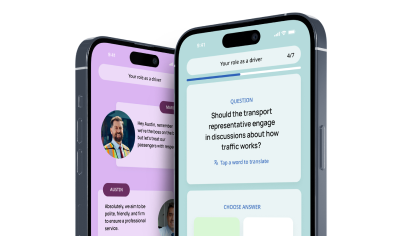9 leadership development training topics every well-planned program should cover in 2025

Each of these topics for leadership training contributes uniquely to shaping competent and confident leaders, providing them with the tools they need to drive success and inspire their teams. Let's explore this extensive list of leadership training topics in detail, highlighting the value each adds to developing top leaders.
1. Communication: The art of clarity and influence
Effective communication is fundamental to leadership. It's essential for conveying important information, inspiring teams, and fostering a culture of transparency and trust. Research from Haiilo, an employee communication platform, found that 3 in 4 employees see effective communication as the top leadership attribute. Yet, less than 1 in 3 employees feel like their leaders communicate efficiently. This gap highlights the critical need for leaders to develop strong communication skills.
Here are some skills that should be taught under the communication topic:
Verbal communication
- Speaking clearly and persuasively: Leaders must articulate their vision and objectives to ensure everyone is aligned and motivated.
- Practising active listening: Emphasising the importance of listening to team members, acknowledging their input, and responding thoughtfully.
- Managing group discussions: Facilitating meetings and discussions to ensure all voices are heard and productive outcomes are achieved.
Non-verbal communication
- Understanding body language: Interpreting and using body language effectively to reinforce verbal messages and build rapport.
- Recognising facial expressions: Recognising and appropriately responding to the non-verbal cues of others.
- Modulating tone of voice: Modulating tone to convey the right message and emotion, ensuring clarity and engagement.
Written communication
- Crafting impactful emails: Writing clear, concise, and purposeful emails that get the message across effectively.
- Creating comprehensive reports: Creating comprehensive reports that inform and persuade stakeholders.
- Delivering engaging presentations: Developing engaging presentations to communicate key points and data.
- By integrating these communication skills into leadership training sessions, organisations can narrow the communication gap identified in the research.
2. Emotional intelligence: Leading with empathy
Understanding and managing emotions is increasingly recognised as a key component of effective leadership. Leaders with high emotional intelligence (EQ) can navigate complex interpersonal dynamics, foster a positive work environment, and drive team performance. According to a global survey by Adecco Group, 74% of employees want their managers to demonstrate a leadership style focused on empathy and a supportive attitude. This highlights the growing importance of emotional intelligence in today’s workplace.
Here are some skills that should be taught under this topic:
Self-awareness
- Recognising personal emotions: Understanding one's own emotions and their impact on thoughts and behaviour.
- Identifying strengths and weaknesses: Acknowledging personal strengths and areas for improvement to enhance leadership effectiveness.
- Reflection techniques: Using reflective practices to gain deeper self-understanding and insight.
Self-regulation
- Managing impulses: Developing strategies to control impulsive behaviours and emotional reactions.
- Stress management: Implementing techniques to handle stress constructively and maintain composure under pressure.
- Adaptability: Flexibly adapt to changing circumstances and challenges with a positive attitude.
Empathy
- Understanding others' emotions: Developing the ability to perceive and understand the emotions of others.
- Active listening: Practicing active listening to understand team members' perspectives and concerns truly.
- Building trust: Creating an environment of trust and respect through empathetic interactions.
By honing these skills, leaders can create an environment where empathy and support drive team performance and engagement.
3. Decision-making and problem-solving: Leading with logic and creativity
In the fast-paced and ever-changing business landscape, making sound decisions and solving problems effectively is a hallmark of exceptional leadership. Leaders who excel in these areas can guide their teams through uncertainty, drive innovation, and ensure long-term organisational success.
Here are some skills that should be taught under this topic:
Critical thinking
- Analysing information objectively: Evaluating data without bias for well-informed decisions.
- Questioning assumptions: Challenging assumptions and considering alternative perspectives.
- Logical reasoning: Drawing logical conclusions from available evidence.
Decision-making frameworks
- Understanding models: Exploring tools like SWOT analysis and cost-benefit analysis.
- Applying frameworks: Practising these models in real-world scenarios.
- Evaluating outcomes: Assessing the effectiveness of decisions and adjusting as needed.
Ethical decision-making
- Understanding ethical principles: Familiarising with ethical theories and principles in business decisions.
- Balancing stakeholder interests: Considering the impact on all stakeholders.
- Maintaining integrity: Emphasising honesty and integrity in decision-making.
By integrating these skills into leadership training, organisations can ensure their leaders can make informed, ethical, and innovative decisions.
4. Conflict resolution: Turning disputes into opportunities
Effective conflict resolution is a vital leadership skill that transforms disputes into opportunities for growth and collaboration. Leaders who master conflict resolution can maintain team harmony, foster a positive work environment, and drive productivity.
Here are some skills that should be taught under this topic:
Understanding conflict dynamics
- Identifying sources of conflict: Recognising common triggers of workplace conflicts, such as resource competition, personality clashes, and differing values.
- Stages of conflict: Understanding the progression of conflicts from inception to resolution.
Mediation skills
- Facilitating discussions: Guiding conversations between conflicting parties to ensure productive dialogue and mutual understanding.
- Finding common ground: Helping parties identify shared interests and goals to reach a consensus.
- Neutrality and impartiality: Maintaining an unbiased stance to facilitate fair and effective conflict resolution.
Follow-up and continuous improvement
- Monitoring resolutions: Ensuring that agreed-upon solutions are implemented and effective.
- Feedback and reflection: Gathering feedback from involved parties and reflecting on the conflict resolution process to improve future outcomes.
By developing these skills, leaders can foster a positive and productive work environment, ensuring that conflicts are managed constructively.
5. Team building and collaboration: Maximising team potential
Strong team building and collaboration are critical components of effective leadership. Leaders who excel in these areas can create cohesive, high-performing teams that drive organisational success. A Stanford study revealed that employees who embrace collaboration tend to work on tasks 64% longer than those working alone. They also show higher engagement levels, reduced fatigue, and more successful outcomes.
Here are some skills that should be taught under this topic:
Building trust
- Creating a safe environment: Establishing a culture where team members feel comfortable expressing ideas and concerns.
- Demonstrating reliability: Showing consistency in actions and decisions to build credibility.
- Encouraging openness: Promoting transparency in communication and decision-making processes.
Facilitating teamwork
- Defining roles and responsibilities: Clearly outlining each team member’s duties to ensure accountability and avoid overlaps.
- Setting common goals: Aligning team members around shared objectives to foster unity and purpose.
- Promoting interdependence: Highlighting the importance of each member’s contribution to the team’s success.
Enhancing team communication
- Conducting regular check-ins: Scheduling consistent meetings to discuss progress, challenges, and updates.
- Implementing feedback mechanisms: Creating systems for giving and receiving feedback constructively.
- Utilising collaborative tools: Using technology and tools that facilitate efficient communication and collaboration.
Motivating and engaging the team
- Recognising achievements: Celebrating individual and team accomplishments to boost morale.
- Providing growth opportunities: Offering training and development to help team members advance their skills.
- Fostering a positive culture: Creating an environment that supports well-being and engagement.
By mastering these team-building and collaboration skills, leaders can transform their teams into cohesive, high-performing units.
6. Change management: Guiding teams through transformation
Effective change management is a critical leadership skill that enables organisations to navigate transitions smoothly and successfully. Leaders who excel in change management can foster resilience, maintain productivity, and drive positive outcomes during periods of change. According to the CEB 2016 Change Management Head of Function Survey, 62% of organisations rely on implementation plans primarily owned by leaders, highlighting the significant role leaders play in managing change.
Here are some skills that should be taught under this topic:
Understanding change processes
- Recognising stages of change: Identifying and managing the different stages of the change process, from initiation to implementation and sustainability.
- Anticipating resistance: Understanding common sources of resistance and preparing strategies to address them.
Planning and implementing change
- Developing change plans: Creating detailed plans that outline objectives, timelines, resources, and responsibilities.
- Communicating change effectively: Ensuring clear, consistent, and transparent communication about the change process to all stakeholders.
- Monitoring progress: Regularly reviewing and adjusting change plans based on feedback and performance metrics.
Engaging and supporting employees
- Building a change-ready culture: Promoting a culture that values flexibility, adaptability, and continuous improvement.
- Providing support and resources: Offering training and support to help employees adapt to change.
- Recognising and addressing concerns: Actively listen to and address employee concerns promptly and effectively.
By developing these skills, leaders can foster a resilient and adaptable workforce well-prepared for future challenges.
7. Strategic thinking: Shaping the future with insights and vision
Strategic thinking is a critical leadership skill that involves planning for the future, making informed decisions, and driving long-term success. Leaders who excel in strategic thinking can anticipate challenges, identify opportunities, and create a roadmap for their organisation's growth.
Here are some skills that should be taught under this topic:
Vision development
- Crafting a compelling vision: Learning to develop a clear and inspiring vision for the future.
- Aligning vision with organisational goals: Ensuring that the vision supports and enhances the organisation's overall objectives.
- Communicating vision effectively: Articulating the vision in a way that motivates and engages stakeholders.
Environmental scanning
- Analysing market trends: Keeping abreast of industry trends, competitive dynamics, and market shifts.
- Identifying opportunities and threats: Evaluating external factors that could impact the organisation’s success.
- Leveraging data and insights: Using data-driven insights to inform strategic decisions.
Strategic planning
- Setting strategic objectives: Defining clear, measurable goals that align with the organisation’s vision.
- Developing strategic initiatives: Creating actionable plans to achieve strategic objectives.
- Allocating resources: Ensuring optimal use of resources to support strategic initiatives.
By developing these skills, leaders can create a clear roadmap for success, anticipate challenges, and seize opportunities.
8. Coaching and mentoring: Elevating teams through expert guidance
Coaching and mentoring are vital leadership practices that empower teams and enhance performance. Leaders who excel in these areas can guide their teams effectively, fostering a culture of continuous learning and development.
Here are some skills that should be taught under this topic:
Developing personalised development plans
- Identifying individual strengths and weaknesses: Assessing each team member’s unique skills and areas for growth.
- Setting specific goals: Collaborating with team members to establish clear and achievable objectives.
- Tracking progress: Monitoring development and providing ongoing support to ensure continuous improvement.
Modelling leadership behaviours
- Demonstrating integrity: Upholding ethical standards and leading by example.
- Showing resilience: Handling setbacks with composure and teaching team members to do the same.
- Fostering a growth mindset: Encouraging a culture that values learning and adaptability.
Empowering team members
- Encouraging autonomy: Allowing team members to take ownership of their tasks and make decisions independently.
- Building confidence: Providing support and encouragement to boost self-assurance.
- Facilitating skill development: Offering opportunities for training and professional growth.
Coaching and mentoring skills provide a crucial link that ensures the development and continuity between current and future leaders.
9. Adaptability and resilience: Thriving in times of change
Research by Harvard Business School found that 71% of 1,500 executives surveyed in over 90 countries cited adaptability as the most critical leadership quality. This highlights the essential role adaptability and resilience play in navigating challenges and driving success in the digital era.
Here are some skills that should be taught under this topic:
Building resilience
- Managing stress effectively: Implementing techniques to handle stress constructively and maintain mental and emotional well-being.
- Recovering from setbacks: Learning how to bounce back from failures and use them as learning opportunities.
- Fostering perseverance: Cultivating a persistent and determined mindset to overcome obstacles.
Fostering innovation
- Encouraging creative problem-solving: Promoting innovative thinking to find unique solutions to complex challenges.
- Experimenting and learning: Emphasising the importance of experimentation and learning from successes and failures.
- Implementing agile practices: Adopting agile methodologies to enhance flexibility and responsiveness.
By developing these skills, leaders can effectively navigate challenges, drive innovation, and ensure long-term success.






